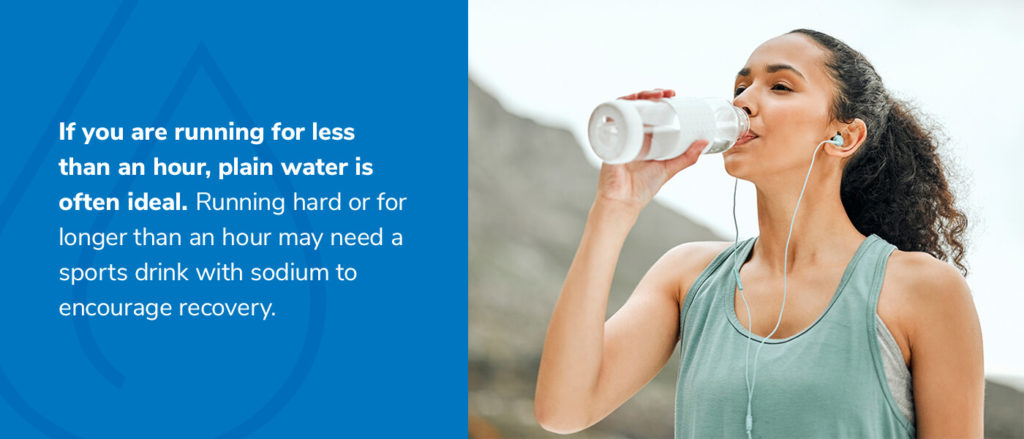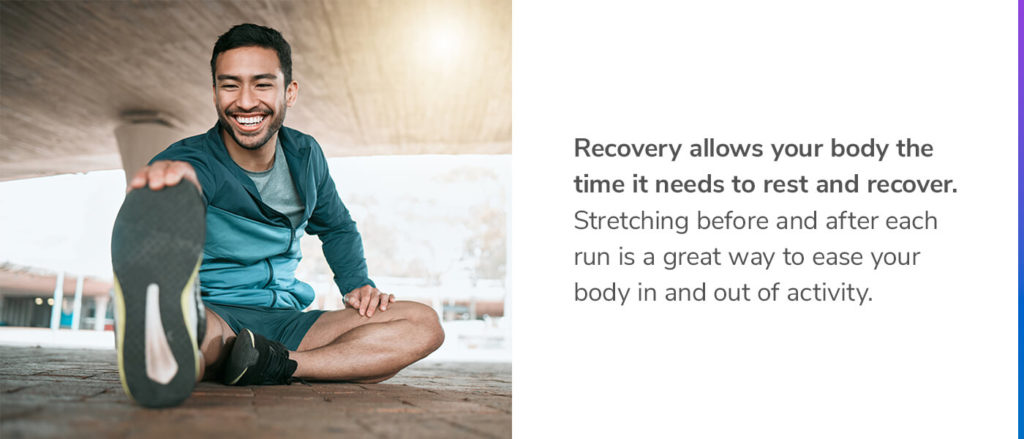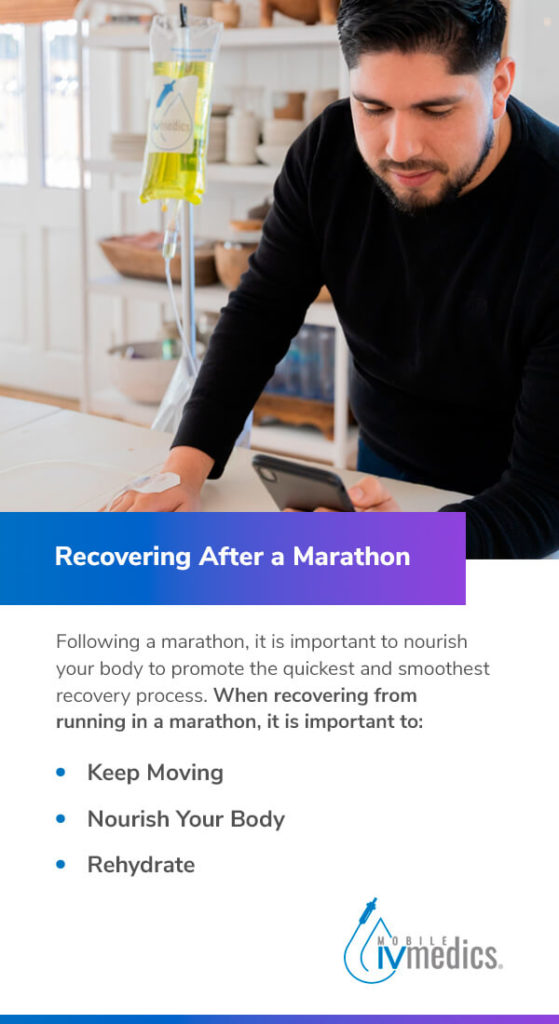A marathon is a great way to challenge yourself to improve your stamina, strength and agility. While a marathon may sound daunting, preparing for a marathon is often simpler than many people realize. With proper preparation and enough time, even those new to running can complete a marathon. Read on for our 15 steps on how to prepare for a marathon.
Table of Contents:
- 15 Steps to Preparing for a Marathon
- Create a Training Schedule
- Do a Long Run Every Week
- Eat a Nutritious Diet
- Stay Hydrated
- Adjust Strength Training
- Set Realistic Goals
- Use the Right Equipment
- Remain Committed to the Process
- Listen to Your Body
- Log Your Runs and Training
- Prioritize Recovery After Each Run
- Follow a Healthy Sleep Schedule
- Prepare Mentally
- Enjoy Yourself and Focus on the Positives
- Arrive at Your Marathon Early
- Recovering After a Marathon
- Keep Moving
- Nourish Your Body
- Rehydrate
- Athletic Recovery With IV Packages
15 Steps to Preparing for a Marathon
If you are planning your first marathon, it is a good idea to create an actionable training program. Preparing for a marathon is an exciting process that involves running, cross-training, rest and planning. It is a good idea to prep for a marathon with ample time to improve your runs and stamina.
As we all know, a marathon is a long run – about 26.2 miles! Marathon training involves patience, practice and perseverance. Before you know it, race day will be right around the corner! When creating a personalized marathon training plan, you may want to consider these tips:
1. Create a Training Schedule
The best way to start marathon prepping is to create a training schedule with an appropriate timeline that allows you to progress and improve your abilities without being rushed. Taking on a marathon before you are ready can greatly increase the risk of injury, accident or medical complication.
Your training schedule and timeline will vary depending on your current fitness level, meaning it is essential to be honest with yourself and note improvements you need to make before taking on a marathon. While each person is different, marathon training often takes about three to six months for most runners. If you have little to no experience with distance running, you may want to take even more time to prepare.
2. Do a Long Run Every Week
Scheduling long runs once a week is a great way to improve your stamina and overall fitness level. While long runs are an excellent component of marathon training, you should also diversify the types of runs you go on each week. You shouldn’t simply run as long and as far as you can every day.
Throughout the week, you should go on runs of different intensities or lengths to train your body. A longer run once a week helps build endurance, stamina and patience. Mixing in shorter tempo runs throughout the week and speed runs can improve agility and other important aspects that influence your ability to run a marathon.
3. Eat a Nutritious Diet
Preparing for a marathon involves a lot of exercise and activity. In most cases, it’s more exercise than your body is used to. As you run often, your body will need more nutrients to support this activity and strengthen muscles. It is essential to provide your body with the right number of calories to remain energized and healthy.
While calories play an important role in your diet, it is also important to focus on the types of calories and protein intake. Despite needing more calories to sustain long runs, your body needs the right kind of calories, not junk food. Prioritizing whole, nutrient-dense and unprocessed foods can give your body the fuel it needs while training.

4. Stay Hydrated
Hydration is a key element of running a marathon and while training for distance running. As you train, you lose essential fluids while sweating. You need to replace these fluids with water, but sports drinks are also great options to replace lost fluid.
In general, if you are running for less than an hour, plain water is often ideal. Running hard or for longer than an hour may need a sports drink with sodium to encourage recovery. When planning a run, drink plenty of water before, during and after your workout.
5. Adjust Strength Training
Cross-training is an important aspect of improving your overall athletic ability and muscle endurance. In addition to running, you should prioritize strength training to improve mobility, decrease the risk of injury and build strength. Strength training before and after a run is a great way to create a dynamic exercise routine.
When adding strength training, it is important not to overtrain your body. While pushing yourself and accepting new challenges is a great way to progress, you need to listen to your body and not push it beyond its limits. Low-impact strength training can give you the physical and mental boost you need to take on a marathon.
6. Set Realistic Goals
When setting goals, it can be easy to get excited and think far in advance. If you only have a couple of months to prepare, you may not achieve all of your goals, but that doesn’t mean you can’t make a large amount of progress.
When setting your goals, one of the most important things to consider is if they are achievable. We shouldn’t set a goal in an unrealistic timeline because that can cause us to feel unmotivated or disappointed when we don’t achieve this goal. Instead, aim for setting smaller, realistic goals, as small goals will lead to larger transformations.
7. Use the Right Equipment
If you are embarking on a marathon training program, make sure you have the right equipment. One of the most important pieces of equipment is a good pair of running shoes that promote proper foot health during training and on the day of your big race.
You may also want to consider anti-chafe products, as chaffing is a common issue for many long-distance runners. Moisture-wicking shirts and shorts can also keep you comfortable and dry when running. Many cost-effective, high-quality options are available.
8. Remain Committed to the Process
Like any process, preparing for a marathon can be challenging, and it is important to remember why you started this journey in the first place. It is normal to have difficult days or challenging runs, but the important thing is to remain positive throughout the process.
It is important to realize that, at times, you may feel like quitting. This is a completely normal feeling that most people deal with at some point throughout their training routine. Understanding this is a normal feeling can help you work through difficult times and remain committed to the overall process.
9. Listen to Your Body
While preparing for a marathon involves challenging our bodies and pushing ourselves to keep improving, it is also vital that we listen to our bodies. Sometimes, our body may need rest or can’t endure a long-distance run on a particular day. Listen to your body and ensure you give it the rest, nutrients and hydration it needs.
There is a difference between feeling a little sore or hurting a bit after a run and being injured. A little discomfort and soreness mean you are training hard, but feeling intense, sharp or persistent pain may signify injury. If you experience unusual moments of pain or discomfort, you should see a doctor or give yourself an extra rest day.
10. Log Your Runs and Training
Logging your runs is a great way to track your progress. We often make small progress between weeks that isn’t noticeable to us. Comparing run times or distance between weeks can help you visualize the small improvements you make each week.
Although you may be more inclined to log good runs, you should also log your bad runs or days. While these days aren’t the best, they are part of the journey and help you grow. You can manually log your runs on a spreadsheet or use a run-tracking app to log runs digitally.

11. Prioritize Recovery After Each Run
Recovery after each run or exercise is just as important as the exercise itself. It is normal for your muscles to ache or your body to be a bit sore. Recovery allows your body the time it needs to rest and recover. Stretching before and after each run is a great way to ease your body in and out of activity.
You also need to prioritize rest days. You may feel like you don’t have a lot of time to train, but overtraining your body can lead to injury and minimize the effectiveness of training. Rest and recovery soothe sore muscles, minimize joint aches and promote healing.
12. Follow a Healthy Sleep Schedule
A healthy sleep schedule is an important component of marathon training. Without enough rest, training will be less effective. Marathon training can be a large adjustment for your body to make, especially if you are newer to running or regular exercise.
It is normal to feel physically and mentally exhausted from marathon training, and getting enough sleep can provide your body with the energy it needs to continue training. Sleep is the primary time your body repairs itself and recovers. Marathon runners typically need more sleep than those who may be less active.
13. Prepare Mentally
While a large focus is placed on physical training and preparedness, you should also prepare mentally for your training and the big day. Marathon training takes commitment, determination and drive, meaning your daily headspace and mental health play a large role in your ability to stay on track.
Although bad runs or training days are normal and to be expected, it can be helpful to meditate and practice other mental health habits to ensure you are mentally prepared for the journey of marathon training. Visualizing your run and motivating yourself are two major ways your mentality affects your marathon training.
14. Enjoy Yourself and Focus on the Positives
Although training for a marathon is a lot of work, dedication and effort, you should try to focus on the positives and enjoy your experience. Training for a marathon can be such a rewarding, exciting experience, especially as you see improvement in your runs from week to week.
It is normal to feel a bit nervous as the day of your marathon approaches, but try to remain excited, knowing you have put the time and effort into training. On your big day, try to enjoy every moment of the marathon, especially relishing the fact that you completed the run!
15. Arrive at Your Marathon Early
Each day of training brings you closer to your marathon. On the day of your marathon, aim to arrive at registration early, as you never know if there will be a lot of traffic or long lines to check in. If your marathon is more than an hour or two away, you may want to consider getting a hotel somewhere closer the day before.
Staying closer to where your marathon takes place gives you time to familiarize yourself with the area and learn where you will have to check in on the morning of your marathon. Leaving extra time in your schedule when arriving can offset any mishaps or delays.

Recovering After a Marathon
Following a marathon, it is important to nourish your body to promote the quickest and smoothest recovery process. When recovering from running in a marathon, it is important to:
Keep Moving
You may want just to sit or lie down immediately after a marathon, but you should ideally keep moving for at least 15 minutes, even if it is a slower walk. You should also avoid static stretching, which can often worsen muscular damage from the marathon. Gradually letting your body cool down after a run minimizes stress and injury.
Nourish Your Body
After running a marathon, your body will need nutrients to recover and heal. Eat a carb-rich snack to replace the carbs your body used while running within the first hour of completing a marathon. Within about one to two hours, you should eat a proper, balanced meal with protein, vegetables and carbs.
Rehydrate
Rehydrating after a marathon is crucial to ensuring your body recovers properly, as your body will lose a lot of fluids through sweat. Following a marathon, ensure you are getting a proper amount of water. While oral hydration is important, intravenous (IV) hydration or recovery packages can be quicker and more effective at rehydrating the body.
Many marathon runners choose to undergo mobile IV treatments to restore the body’s lost electrolytes and fluids. An IV line lets a large amount of fluid be absorbed directly into the body, replacing depleted fluids. You can enjoy the benefits of an IV recovery package with mobile IV treatments, including trained nurses who come to your home or hotel room.
A recovery package is a unique blend of essential vitamins, minerals and nutrients, including vitamin B12, a vitamin B complex, high-dose magnesium, vitamin C, taurine, and zinc.

Athletic Recovery With IV Packages
Mobile IV Medics is a leading mobile IV therapy company that brings innovative IV packages directly to your doorstep. Each of our IV packages is specially created by our pharmacists with the vitamins, fluids, antioxidants and medicines your body needs to feel its best.
Some of our more popular IV packages include hydration, HER, hangover, sunburn and cold and flu. You can also completely customize your own IV package, creating a unique blend of fluids and nutrients to feel your best. Our all-inclusive IV packages can meet all your hydration needs.
Contact us online to schedule a mobile IV treatment or learn more about our IV packages.





